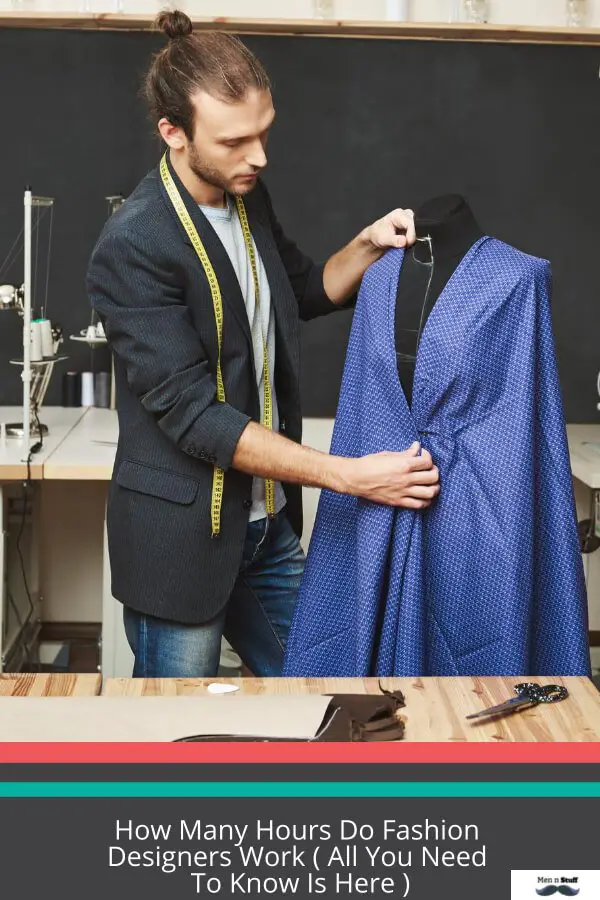Fashion designers typically work 40 hours a week, but longer hours are common during busy periods. A typical day involves sketching, fabric selection, pattern-making, and meetings, totaling 8-10 hours.

How Many Hours Does A Fashion Designer Work Per Week?
When entering the dynamic world of fashion design, one of the questions that often arise is: How many hours does a fashion designer typically work per week? The answer is not as straightforward because it can vary depending on various factors. Nevertheless, this article breaks down the possible working hours across different facets of the job.
- Standard Work Week
In general, most fashion designers work around 40 hours per week. This is the typical work week for many professions and applies to fashion designers working in corporations or for established brands.
- Seasonal Surges
During the fashion seasons, the working hours can considerably increase. Fashion weeks around the world or new collection launches may require designers to work up to 60-80 hours a week. This surge usually happens twice a year.
- Freelancing and Independent Designers
Independent designers or freelancers generally have more control over their schedules. However, they can work highly irregular hours depending on when they get projects. It’s not uncommon for them to work 50-60 hours a week during busy periods.
- Emerging or Startup Design Companies
Working in an emerging or start-up fashion brand often requires more hours, even in non-fashion season periods. This can amount to about 50 hours a week, as these designers may need to contribute to multiple aspects of growing the brand beyond designing.
- High-End Fashion Houses
Fashion designers working in high-end or luxury fashion houses often deal with demanding projects and high standards. It’s generally accepted that they work for 45-60 hours weekly, including late evenings and even weekends.
In summary, while the average working hours for a typical fashion designer falls approximately around 40 hours per week, it can ramp up significantly depending on the season, type of employment, and the specific fashion house they are associated with.
| Setting | Average Working Hours per Week |
|---|---|
| Standard | 40 Hours |
| Seasonal | 60-80 Hours |
| Freelancing | 50-60 Hours |
| Start-ups | 50 Hours |
| High-End | 45-60 Hours |
Balancing creativity and business, the world of fashion design can involve long hours, but for those with a passion for fashion, the rewards can be well worth the effort.
What Does a Fashion Designer Do?
Fashion designers are creative professionals who conceptualize and create clothing, accessories, and footwear. Their roles encompass various tasks:
- Research and Inspiration:
- Gather inspiration from art, culture, history, and current trends.
- Analyze market and consumer preferences.
- Sketching and Designing:
- Create initial sketches and concepts.
- Use computer-aided design (CAD) software for digital designs.
- Fabric Selection:
- Choose appropriate fabrics based on design, season, and functionality.
- Consider factors like color, texture, and durability.
- Pattern Making:
- Develop patterns for garments, ensuring they fit and drape correctly.
- Transform designs into physical templates for cutting fabric.
- Prototyping:
- Create sample garments (prototypes) to test designs and make necessary adjustments.
- Sewing and Construction:
- Oversee or participate in the construction of garments.
- Collaborate with skilled tailors and seamstresses.
- Trend Forecasting:
- Stay updated on industry trends and consumer preferences.
- Predict future fashion trends for upcoming collections.
- Budgeting and Costing:
- Manage budgets for materials, production, and labor.
- Ensure cost-effective production while maintaining quality.
- Collaboration:
- Work closely with fashion merchandisers, buyers, and marketing teams.
- Collaborate with manufacturers for mass production.
- Presentation:
- Prepare and present designs to clients, fashion houses, or buyers.
- Create lookbooks and presentations for fashion shows.
- Marketing and Branding:
- Build a personal brand or contribute to a fashion house’s image.
- Develop marketing strategies for product promotion.
- Quality Control:
- Monitor the production process to maintain quality standards.
- Address any issues with fabric, stitching, or finishing.
- Adaptation:
- Adjust designs based on feedback and market response.
- Keep evolving to meet changing fashion demands.
- Fashion Shows:
- Organize and participate in fashion shows to showcase collections.
- Collaborate with models, makeup artists, and stylists.
- Business Management:
- If independent, handle administrative tasks, contracts, and finances.
- Manage inventory and sales for personal brands.
Fashion designers require a combination of artistic vision, technical skills, business acumen, and adaptability to thrive in the dynamic fashion industry. Their work involves a continuous cycle of creativity, research, and production to bring innovative fashion concepts to life.
Do Fashion Designers Work Long Hours?
Designers are constantly looking at everything from art galleries, museums, movies, and magazines in order to keep their creative juices flowing. Some say all it takes is one random element that they spot on the street or while out shopping with friends to spark an idea. Others head back into their studio after a walk around town and start sketching like crazy until it comes together. A typical day for a fashion designer is about 12 hours! It’s important to note here how long you’ve been designing clothes (years), as well as how much experience you have under your belt (years).
1. Did designers always work this many hours? No, not always – but when we look at current trends in the industry today there seems to be more competition than ever before.
2. What is the average salary? The annual median pay for a fashion designer in the United States was $68,610 as of May 2013, according to BLS data. This means that half of all designers earned more than this amount and half less.
3. How much do they make an hour? That’s not how it works! A typical workweek is 40 hours – but there are plenty of exceptions when working on deadlines or with multiple jobs at once (i.e., freelance).
4. Do you need lots of education to become a designer? In order to be considered for higher-level positions such as Assistant Designer or Design Director, the experience will usually take precedence over formal credentials…so your ability to create designs quickly and effectively will determine whether you get the job.
5. What is the best degree for a designer? It depends on your specialty, but it typically boils down to three options: fashion design, interior design, and graphic design.
6. Do designers need math skills? Yeah, actually they really do! A lot of people think that because designing clothes requires creativity more than anything else – how can someone be creative without numbers?? Well if you want to create an outfit from scratch (without using pre-existing designs) then yes – give me some statistics, please!! You’ll need to understand how proportions work in order for any garment to look right! And don’t forget about pattern matching…it’s basically like doing multiplication with fractions so yeah, good luck 🙂
What Is A Typical Day For A Fashion Designer?
Designers typically start their day by doing research, which could include surfing the web for new trends. They might then go on to create sketches of potential designs or patterns with pen and paper before transferring them onto a computer screen as digital illustrations.
They may also sketch out ideas on how they think different fabrics will look when combined together. Once this initial stage is finished, designers often meet up with a team to come up with more detailed plans about what needs to be done next in terms of both design work and marketing strategies. Other responsibilities can vary depending on where somebody works but general tasks would include making sure deadlines are met, managing budgets and overseeing other employees – such as garment makers who actually make the clothes! All fashion designers must have a strong background in fashion, as well as a degree or MA.
Designers may be required to work long hours due to tight deadlines and strict client expectations.”
“Fashion designers often have an assistant who helps them with most of the routine tasks such as emailing clients about their next meeting date which frees up time for the designer’s creative projects. Some assistants will also help run online searches to find images that are relevant to what the designer is currently working on; these days it can take several minutes just searching through Google Images let alone sites like Pinterest so this type of assistance would make life much easier!”
References:
https://www.zippia.com/answers/what-is-a-typical-day-for-a-fashion-designer/
https://www.princetonreview.com/careers/63/fashion-designer

